|
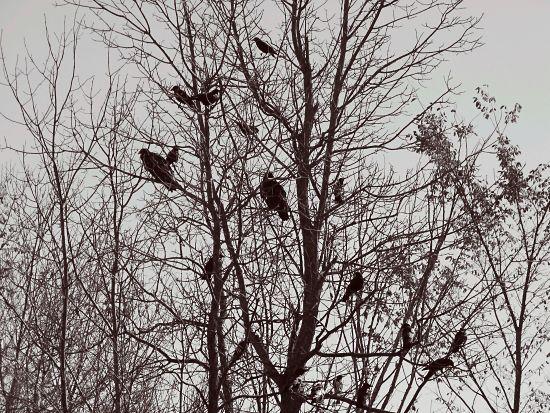
photo - mw
_______________________
"I am no longer capable of writing about": The Letters of Samuel Beckett 1941-1956
Stephen Mitchelmore
This Space
(....)If we search these letters in the hope of finding Beckett’s secret, we betray our admiration and need. The question assumes the mastery it must divest to discern an answer. One of the final letters in this volume is to a young writer seeking guidance and consolation from a writer he revered: “Don't lose heart” he tells Robert Pinget, “plug yourself into despair and sing it for us.”...(more)
_______________________
Andrei Codrescu: Two New Poems
presented by Jerome Rothenberg
Facebook Redux
(....)
in the U.S. where everybody is on Facebook
pretending to be just hanging out
discussing the quirks of their dogs
their tastes in music and what they want in a mate
Facebook is just pixel puff off a virtual dog
its data bots eat your brain and make you buy stuff
and if you make a move that looks vaguely human Facebook arrests you
and connects you to Twitter LinkedIn and other social groups
where communication will rehabilitate you
(....)
...(more)
_______________________
A Joke from God
An Interview with Helen DeWitt
n + 1
(....)
CG: Do you think that people should read fiction?
HD: Well, there’s good fiction. There are wonderful books, and yes, it’s good to read them. Maybe if you’ve read a lot of fiction, you reach this stage of satiation, and you start thinking well, what’s the point, but then you talk to people who’ve read barely any, and you realize that things you take for granted if you’ve read a lot of fiction—unreliable narrators, how language frames your perception of people—things that seem obvious to the point of banality, except they’re not to people who aren’t in the habit of reading fiction.
CG: I admit my appreciation of Lightning Rods was enriched by having been exposed to so much bad contemporary fiction. If I hadn’t read Freedom—which is an important intertext for Lightning Rods, you might say, for the reader if not for Helen—I wouldn’t have appreciated the intervention that Lightning Rods makes. The way it comments on this American tradition of writing books about middle-aged men. Most books, of course, do not intervene, they just repeat. They rehash.
HD: Well, yes, I get horribly depressed. Books come along, and I open them in bookstores, and you see something sort of respectably done, it’s not like it’s badly done, but it makes me want to cut my throat.
...(more)
Helen DeWitt's books at amazon The Last Samurai
Lightning Rods
_______________________

photo - mw
_______________________
Otoliths issue twenty-three
Apparition Poems
Adam Fieled
#1171
She’s been by the lake—
dredging up mud from
pearls, shells, starfish,
to be lavished in color
on thick tan canvases,
put up in public spaces
to remind those eyes
that are open to shape,
color, hue, depth, light,
what is and what isn’t
when we say “reality”—
...(more)
_______________________
An Interview with George Szirtes
... that sense of material body is heightened in translation: each language destabilises the other: that means we become more aware of the fallible body of each language. One language asks: Can you do that? The other replies: I can do this, which is like that. The first language cannot know if it is properly understood: language two understands there are some things it can’t do. Their joint experience is uncertainty of intention and meaning and the sense of limit in both.
(....)
... mirrors and photographs are related. Broadly speaking, I think Barthes gets it right in Camera Lucida. The photographic moment is fascinating because it is by its very nature tragic, a memento mori. The moment has, by definition, gone. The record of the moment anticipates and includes the moment of going. Of course there are great photographers and ordinary snapshots. The great photographs are those where the image is not merely record but symbol. Everything is precisely where it had to be in order to generate a meaning beyond itself. Record and symbol are endlessly fascinating. Keats’s figures are frozen in a formalised moment, in a state of stylised desire. In that sense they too are potent symbols....(more)
_______________________

photo - mw
_______________________
The Gulf Of Mexico (Social Realism)
Andrei Codrescu
(....)
migratory birds know
where to go
something outside of them tells them
where to go
something inside them says yes
and then it's off to mexico
but never again to the gulf of mexico
that's voided pedagogy
dead verbs nouned
remember
derivative was once to derive
and so the body was derived from the need to feed
and the puddle dried up
adjectives too had a hard time
but everything is fast now
don't bet on language
to be on your side
it's not
not because it's venal
but because it's in constant use
if we gave our language a break for let's say a century
and kept quiet with our needs at a minimum
we might turn into finer animals horses let's say
(....)
...(more)

first ice
in the birdbath
photo - mw
_______________________
Five Poems [pdf]
Jerome Rothenberg
THREE PARIS ELEGIES
[1]
into my own dark sunday light approaches like the moon through feathers
that’s no sooner seen than sunk by blindness & the thought that everyone
is dead around a city that’s about to vanish as it has before sucked down
an empty pocket oversized & with a smell of earth the bright adventurers
of 1910 whose streets these were sharing a common grave with those who
followed reaching even to the place where you and I are waiting with the
friends who drop out one by one like cybermonkeys flying into mindless
space
(....)
Janus Head
Volume 12, Issue 1
_______________________

R.B. Kitaj
b. Oct.29, 1932
_______________________
Karen Kevorkian - Eight Poems
archipelago volume 9
Willow and Pecan, Hackberry and Huisache
Not a language of grief
the well rehearsed green chorus
bends to one side. A sleek blackbird erupts.
Somewhere
a chainsaw. Somewhere
a leaf blower. Somewhere
a clock ticks in a room
where doves query one-two
and three hah hah over there
collect
a pear go comb
your hair go say
a prayer oh don’t
be scared opulent
pink flames at the window
western sky graying
shadow wants the streets
still body on the bed. Dove lusters
Go now. Go.
Oh oh oh from the trees.
Karen Kevorkian at the drunken boat
Lizard Dream and White Stucco Black Wing
Karen Kevorkian
amazon links
_______________________
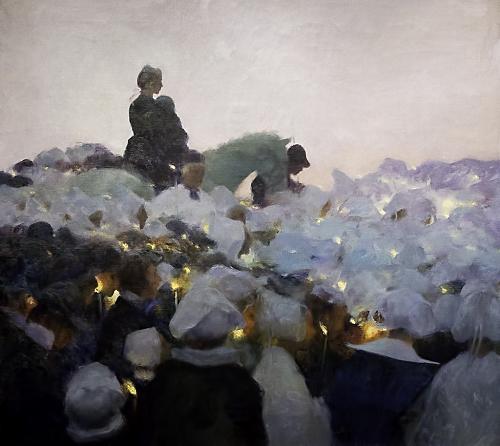
Pardon in Brittany
1896
Gaston La Touche
b. Oct. 29, 1854
_______________________
Anarchist Meditations or:
Three Wild Interstices Of Anarchy and Philosophy
Alejandro de Acosta
I dare to call certain turbulent interstices of anarchy and philosophy wild. I feel that there is a lot of activity there, but not (yet) along predictable lines. For some time now, those interested have been hearing about several other such interstices: tamer ones, from my point of view. Or at least more recognizable. So let us play the familiar game of theory and practice, that game in which we presuppose them as separate and seek to claim them reunited. From within the play of this game, the tame interstices are variations on the following moves: philosophers allude to anarchist practices; philosophers allude to anarchist theorists; anarchists allude to philosophers (usually in search of theory to add to the canon). What is missing in this schema, I note with interest, is anarchists alluding to philosophical practices. These are the wild interstices: zones of outlandish contact for all concerned, I think.
But there are other games to play, even if they are only innocent games of exposition. I think it is important and interesting to stop presupposing separation, to dissolve its painful distribution of thinking and action. That is, we might hazard the risky game (which is also an experience, an exercise) in which there are no theories, no practices; just more or less remarkable enactments of ways of life, available in principle to absolutely anyone, absolutely anywhere....(more)
Anarchist Developments in Cultural StudiesNo 1 (2010)
_______________________
The purpose of writing, as a matter of death and life
Jamie Lin Weirong
I begin with a question, one as essential as it is general: why do we write? Or perhaps my concern is instead with the question, why should we write? The former seeks only reasons, the latter, a purpose. I am not concerned with the more practical uses of writing, such as facilitating communication, documenting and transmitting learning, or recording and sharing one's thoughts and feelings. What I am interested in is a far more ineffable sense of writing's necessity, the idea that one feels compelled to write when it is not at all necessary to do so, precisely when writing is not expedient to any particular purpose. The Bohemian-Austrian poet Rainer Maria Rilke refers to this when he counsels an aspiring poet:
Go into yourself. Search for the reason that bids you write; find out whether it is spreading out its roots in the deepest places of your heart, acknowledge to yourself whether you would have to die if it were denied you to write. This above all – ask yourself in the stillest hour of your night: must I write? (Letters to a Young Poet, 1934)
(....)
Franz Kafka alluded to exactly the same temperament when he wrote in his diary:
On the way home told Max that I shall lie very contentedly on my deathbed, provided the pain isn't too great. I forgot – and later purposely omitted – to add that the best things I have written have their basis in this capacity of mine to meet death with contentment. All these fine and very convincing passages always deal with the fact that someone is dying, that it is hard for him to do, that it seems unjust to him, or at least harsh, and the reader is moved by this, or at least he should be. But for me, who believe that I shall be able to lie contentedly upon my deathbed, such scenes are secretly a game; indeed, in the death enacted I rejoice in my own death, hence calculatingly exploit the attention that the reader concentrates on death, have a much clearer understanding of it than he, of whom I suppose that he will loudly lament on his deathbed, and for these reasons my lament is as perfect as can be, nor does it suddenly break off, as is likely to be the case with a real lament, but dies beautifully and purely away.
Here Rilke's position is inverted, while the same connection between writing and death is retained: where Rilke sees death as an answer to a life without writing, Kafka sees a life of writing as what enables death. In both their statements, writing and death are entwined in a circularity: one lives by one's writing and yet, one dies all the better for having written.
Maurice Blanchot's reading of this circularity finds a "profundity of experience" (The Space of Literature, 1955) captured within this aporia, to which our response ought be a patient explication that attempts to understand how such a relationship may be explained. ...(more)
Quarterly Literary Review SingaporeVol. 10 No. 4 Oct 2011
_______________________

Shirley's Bay
Ottawa River
photo - mw
_______________________
Crisis Theory in a Crisis Society
Interview with Norbert Trenkle (Krisis)
Interviewers and translators: Timo Ahonen and Markus Termonen. Originally made for the Finnish Magazine
Megafoni
2003
(....)
What we as theoreticians can initially accomplish in this process, is the deciphering of the destructive fetishistic logic of this society and the critique thereof in this manner. By doing this and trying to concretize the critique of diverse phenomena, also on the diverse levels of society, something like a negative point of orientation develops for a possible anti-capitalist practice. Negative in the sense, in that it becomes clear what must be struggled against and transcended. But socio-critical theory must also be aware of its own limitations. It cannot and must not give instructions for such a practice or even create any future plans that must be “realized.” Above all, it must not try to postulate any principle for a postcapitalist society. For if anything at all can be said about postcapitalist society, it can be said that it will not be subjugated to an everywhere valid, abstract-universal central principle, like in the case of the prevailing society that must for better or for worse obey the dictum of valorization. Although, out of this critique, rough statements can be made about what a transcendence of the commodity society could mean, they must remain at a very abstract level and can in the end only be concretized by a social movement. It can, for example, be said that in a postcapitalist society humans will no longer and indirectly form their social relations, which take place behind their back, through the fetishistic forms of money, work, labor, and state. Above I would have described it with the expression “structures of social self-organization.”
But at the same time, from this theoretical insight it follows than an anticapitalist movement must not be orientated toward conquering the state (which is in accordance with the traditional revolutionary models). As a perspective for action, it can rather be stated: starting a process of direct appropriation of the social connections (from the means of production, existence, and communication, and through means of cultural expression up to the relations of daily life) in the course of which new forms of social agreements and understandings must be developed. What this means exactly cannot be anticipated, but must be “discovered” in a long process and through many experiences and attempts. And in this process the relation of theory and practice will naturally ultimately change according to the extent that reflection is carried as an essential part into the social performances of action.
But we have by no means reached this point, and it is not even certain, if we are ever going to reach it. Today the question arises as to what socio-critical theory can contribute so that an anticapitalist movement develops out of the protest and resistance against the prevailing conditions. A “strategy” for that does not exist. But by the intervention of social critique on the level of discourse, and by playing the own melody of the prevailing conditions back to them, as was nicely expressed by Marx, a social critique can perhaps function as a catalyst for the formation of such a movement....(more)
_______________________
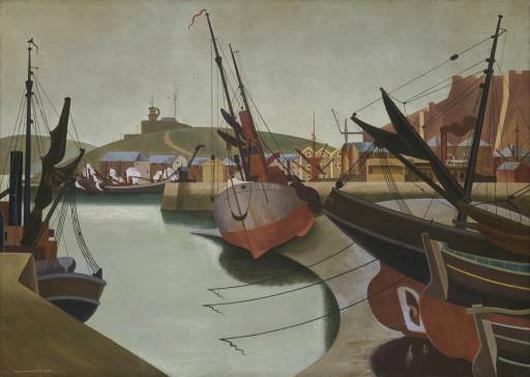
Seaport
1923
Edward Wadsworth
b. Oct. 29, 1889
_______________________
Pedagogy of the Oppressed
Paulo Freire
Translated by Myra Bergman Ramos
mediafire pdf
Education for Critical Consciousness
Paulo Freire
google books
We Make the Road by Walking: Conversations on Education and Social Change
Paulo Freire and Myles Horton
mediafire pdf
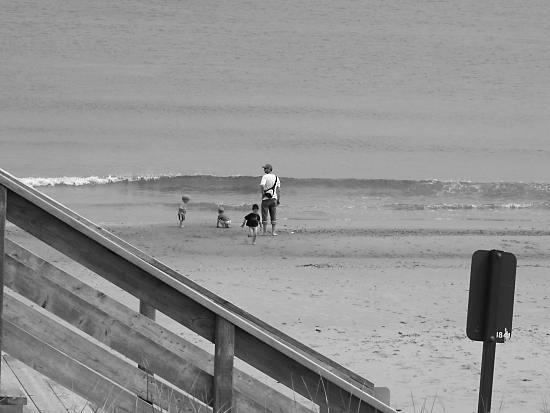
photo - mw
_______________________
Undertow
Dean Young
People looking at the sea,
makes them feel less terrible about themselves,
the sea's behaving abominably,
seems never satisfied,
what it throws away it dashes down
then wants back, yanks back.
Comparatively, thinks one vice president,
what are my frauds but nudged along
misunderstandings already there?
I can't believe I ever worried
about my betrayals, thinks the analyst
benefitting facially from the sea's raged-up mist.
Obviously I'm not the only one suffering
an identity crisis knows the boy
who wants to be a lawyer no more.
...(more)
_______________________

photo - mw
_______________________
A process in the weather of the heart
Dylan Thomas
Oct. 27, 1914 - Nov. 9, 1953
A process in the weather of the heart
Turns damp to dry; the golden shot
Storms in the freezing tomb.
A weather in the quarter of the veins
Turns night to day; blood in their suns
Lights up the living worm.
A process in the eye forwarns
the bones of blindness; and the womb
Drives in a death as life leaks out.
A darkness in the weather of the eye
Is half its light; the fathomed sea
Breaks on unangled land.
The seed that makes a forest of the loin
Forks half its fruit; and half drops down,
Slow in a sleeping wind.
A weather in the flesh and bone
Is damp and dry; the quick and dead
Move like two ghosts before the eye.
A process in the weather of the world
Turns ghost to ghost; each mothered child
Sits in their douible shade.
A process blows the moon into the sun,
Pulls down the shabby curtains of the skin;
And the heart gives up its dead.
_______________________
Beyond Wall Street
A statement on strategy
Resist and Multiply
What are people so upset about?
People wonder what the protesters at Wall Street stand for because everyone seems to have a different answer. However, the only reason the movement has been able to stay alive this long, and even grow, is because the protesters agree: The society we live in works to benefit a very small few at the expense of the majority. The problem is not based on greedy individuals in power, but rather the whole capitalist structure. Even if we agree that this is the problem, our solutions are different because the system is complex and affects all of us differently.
Capitalism is the reason we’re in debt, unemployed, and struggling to pay rent. But capitalism also affects the way we think about ourselves and the way we relate to each other. Most of us have been told over and over again that rich people are rich because they work hard; that we need to look out for “number 1” in order to succeed like them. But living this way makes us feel like shit. It destroys our sense of community and meaning in life, and we feel apart from our neighbors, co-workers, and classmates. We feel alienated.
The thing that unifies Wall Street protesters is the opportunity to overcome this alienation through experiences of shared social responsibility through collective decision making and based on achieving a better future. It’s not perfect, but it’s a start....(more)
Resist and Multiply
_______________________
Occupy Wall Street's Battle Against American-Style Authoritarianism
Henry A. Giroux
... within a very short time, the Occupy Wall Street protesters have changed the national conversation from the Republican right-wing discourse about deficit reduction and taxing the poor to important issues that range from poverty and joblessness to corporate corruption. They have all but usurped dominant media and cultural apparatuses that have been enormously successful in normalizing the ideology, values and social practices of market fundamentalism for a number of decades.
But most importantly, as writer Jonathan Schell has argued, they have unleashed "a new spirit of action," an expression of outrage fueled less by policy demands than by a cry of collective moral and political indignation whose message, says Schell, is "'Enough!' to a corrupt political, economic and media establishment that is hijacking the world's wealth for itself, immiserating ordinary people, sabotaging the rule of law, waging interminable savage and futile wars, plundering the world's finite resources, lying about all this to the public and threatening Earth's life forms into the bargain."
The spirit of action that informs the current protest movement is not about providing recipes or tossing around facile slogans - it is about using new pedagogical tools, practices and social relations to educate the rest of the American public about the dangers of casino capitalism as a new form of authoritarianism. The Occupy Wall Street protests offer a new language of critique and hope, while inventing a mode of politics in which the claims to justice, morality, and social responsibility prevail....(more)
_______________________
The Violent Silence of a New Beginning
The Occupy protests are important, but soon the difficult question must be answered: What social organization can replace capitalism?
Slavoj ˇi˛ek
_______________________
Occupy Wall Street beta tests a new way of living
Douglas Rushkoff
_______________________
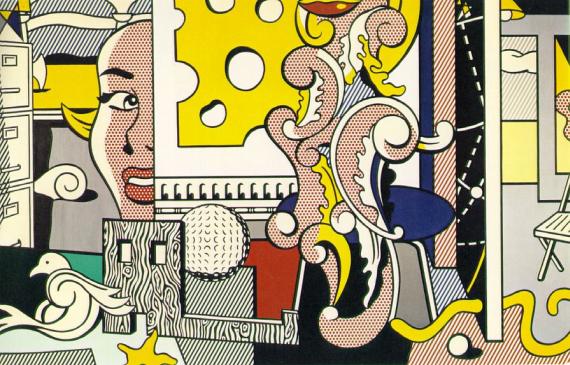
Go for Baroque
1979
Roy Lichtenstein
b. October 27, 1923
_______________________
These youthfully exuberant essays on translation, innovation, performance, and audience are compelling, delightful, and often funny: illuminating as Reykjavik white nights and sharp as the skate blade of a North American racing champion.
- Charles Bernstein
"Booby, be quiet!" esays by Eirķkur Örn Noršdahl
free pdf of new book poesia
Some excerpts:
The importance of destroying a language (of one’s own)
Some weeks ago I was sitting at a café in Helsinki with two Finnish poets discussing the whole “writing in Englishas- a-second-language” thing that has become more and more popular – there are several blogs in the world for this, books have been published – amongst those Leevi Lehto’s Lake Onega and other poems – and as Leevi has pointed out it may be a way for non-English speakers of gaining the upper hand on English-speaking constraintual super-poets like Christian Bök, who could never enjoy the benefits of working in English-asa- second-language. Of course, although Christian could not learn to speak English-as-a-second-language, he could learn how to speak Finnish-as-a-second-language – but there really is no language in the world that can compete with English, it’s the only one with proper momentum, and perhaps especially English-as-a-second-language.
Reenter: Experimental poetry. Sitting at said café, discussing the niceties of actually having a common culture with the international avant-garde, post-avant, experimental, radical writing, language whaddyawannacallit, it also dawned on me that the need to fuck over our own languages is imminent. ...
(....)
.....................................................
The metaphorical crisis
This cup of café latté is like a few minutes of work. Between every droplet of coffee and my work stands a peculiar equal sign – a hammered “like” or “as if ”. Between the source domain and the target domain stands the analogy which controls our lives – the metaphor itself which we cannot escape, incessantly becoming deeper while multiplying in layers. The dime. The króna. The euro.
This dime is the “like” between the cup of coffee and the work, it separates my labour from my luxury. Unless I exchange the dime for a bank-card. Which would make having the bankcard “like” I had a dime, which would be “like” I had coffee. You run it through your card-reader and we pretend as if I’d earned my coffee. We could take this even further with a credit card. We could then pretend as if I would earn the coffee at some point in the future.
But then our metaphor-machine suffered a meltdown and suddenly we had nothing. No more café latté. No more dimes. No more loans. Icelanders had participated in the western like for about a half a century. We got to pretend like we had TVs and cars, when all we really had was loan contracts and incremental payments – neither the cars nor the TVs lasted (we still have the loans). Which isn't what makes the money imaginary. The money was imaginary all along. Or euphemisms. Hyperbole. Poetry. And like the Icelandic middle classes bought toys with loans Icelandic businessmen bought toy-stores with loans. With similes.
When the fairytale finally came to an end people were literally asked not to personify the problem. But what were they to do, other than fall into the arms of a metaphor? Yet if I remember correctly personifications were never practiced to any extent – no one was ever arrested for fiscal crimes – but the metaphor as such was strong nonetheless. For the whole winter after the collapse people behaved as if they were angry – some people were even elected to parliament based on their as if anger (and immediately started behaving like politicians). People spoke of the end of capitalism as if nothing was more natural. People whose lives depended on maintaining capitalism.
Capitalism is dead, said the people. The metaphor is dead.
And then.
Long live capitalism. Long live the metaphor.
(....) .....................................................
Eirķkur Örn Noršdahl at PennSound
_______________________
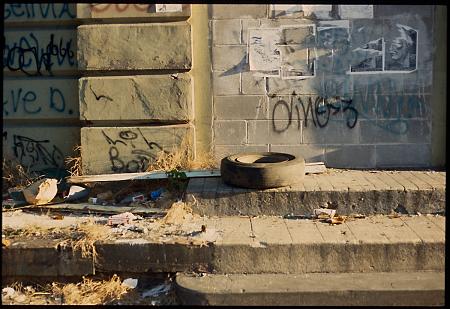
Alphabet City Spare Tire
1979
NYC 1978-1985
Michael Sean Edwards
flickr
_______________________
A Voice From the 1%
(....)
Herman Cain's 9-9-9 plan would save me roughly $400,000 a year in taxes, and President Obama's tax proposals would cost me more than $100,000, yet I support the latter and consider the former laughable.
(....)
I was not amazed but disgusted when John Boehner and his crew tried to justify the extremity of their position by rebranding the wealthy as "job creators." While true in a very basic sense, it obscures the fact that jobs are a cost that is voluntarily incurred only as a result of demand. Hiring has no correlation at all to profits or to income - none. Let me keep more of my money without increasing customer demand and I will do just that - keep it. Perhaps I will spend a little more of it, though probably not, but even if I do it won't help the economy very much. Here is another secret of the well-to-do: we don't really buy much more stuff than everyone else. It may be more expensive stuff, sure, but I don't buy cars, or appliances, or furniture, or anything else more frequently than the average consumer. The things I do spend more money on are services such as travel, entertainment, restaurants and landscaping, none of which generate well-paying middle class jobs. There, in a nutshell, is the sad explanation of what has happened to the American economy over the last 25 years of "trickle down" economics....(more)
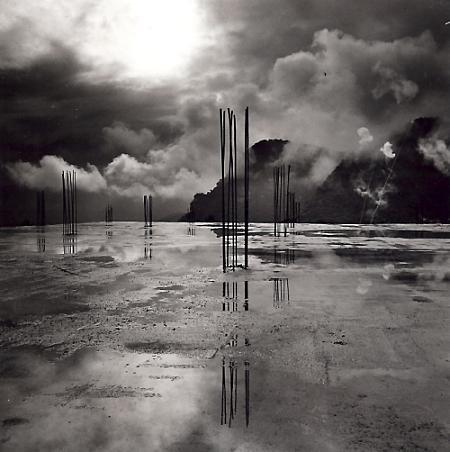
Graciela Iturbide
_______________________
It Must Be Sophisticated
John Ashbery
There are attics in old houses
where doubt lingers as to the corrosive
effect of night-blindness: namely
are its victims directly linkable to a chain
of events happening elsewhere? If so,
we should shrug off resemblances
to our line of work. ...
(....)
... Back when they'd send for you
once they got a house built, it was clever
to hedge your bets and produce a fraternal twin
made of bedclothes with a mop for a wig
while you scaled the wall on a rope ladder
to be the next new thing that thinks
and cautions others not to. Far from the
inner city cry of conflicting attitudes, one fled with one's
holy illusions intact, one's misconceptions too, until the whole
mindset took on a largely symbolic
look, an indifferent jewel, toy
of the weather, of successive washes of light,
I can hardly believe I'm here
in this tiny republic carved out of several conflicting
principalities. It's enough, perhaps, that I was questioned
at the edge of my performance. ....
...(more)
_______________________
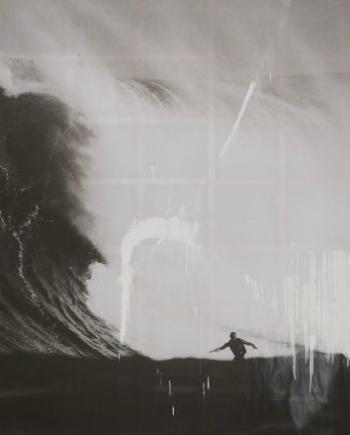
Julian Schnabel
b. October 26, 1951
_______________________
After MP (2)
Jonathan Mayhew
¡Bemsha SWING!
"I speak in the passive voice."
No, that's not quite right.
One would think rocks would get rough with age,
wouldn't you? An argument not worth having,
Camarón told him, he didn't believe it.
Spinoza told him, he didn't believe it.
But what? The thinness of strangers?
Gruel for thought?
...(more)
_______________________
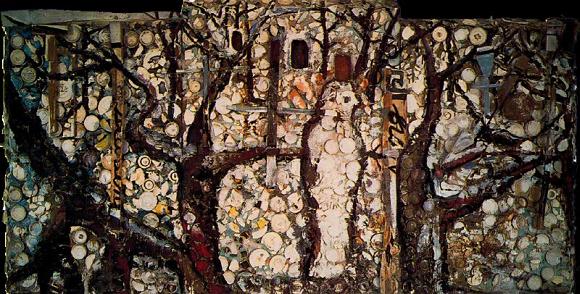
The Student of Prague
Julian Schnabel
1983
_______________________
Adam Fieled: Best of/ Sampler
poems were originallyfeatured in: Blazevox (in book form), Jacket, Pennsound, P.F.S.Post, moria, Mad Hatters' Review,and Mipoesias.
scribd
#1345
Two hedgerows with a little path
between— to walk in the path like
some do, as if no other viable route
exists, to make Gods of hedgerows
that make your life tiny, is a sin of
some significance in a world where
hedgerows can be approached from
any side— I said this to a man who
bore seeds to an open space, and he
nodded to someone else and whistled
an old waltz to himself in annoyance.
Adam Fieled's Miscellaneous
_______________________

Absurd perspectives
William Hogarth
(10 November 1697 - 26 October 1764)
_______________________
"I am a frayed and nibbled survivor in a fallen world, and I am getting along. I am aging and eaten and have done my share of eating too. I am not washed and beautiful, in control of a shining world in which everything fits, but instead am wandering awed about on a splintered wreck I've come to care for, whose gnawed trees breathe a delicate air, whose bloodied and scarred creatures are my dearest companions, and whose beauty beats and shines not in its imperfections but overwhelmingly in spite of them, under the wind-rent clouds, upstream and down."
- Annie Dillard, Pilgrim at Tinker Creek
via
_______________________
Murmurs
Spurious
Where's it all going? Where's it all leading? Is there a pattern? Is the pattern falling apart? W.'s in the dark, and it's not a propitious darkness. It is not a resting place. There are terrible stirrings out there. Murmurs.
Something is awakening. Something is turning in its sleep. And as it turns, we turn too. Will our lives make sense one day, when it wakes? Will it all become clear on the day another part of us stands and stretches in the sun?
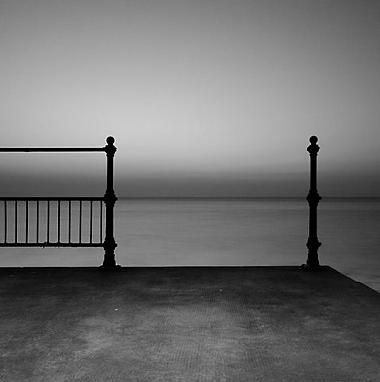
Adam Clutterbuck
flickr
_______________________
Market Outcomes and Political Power
Martin Hart-Landsberg
The media likes to talk about markets as if they were just a force of nature. In fact, markets and their outcomes are largely shaped by political power. In a capitalist system like ours, that power is largely used to advance the interests of those who own and run our dominant corporations.(....)
imagine if we had a state that engaged in transparent planning and was committed to using our significant public resources to reshape our economy in the public interest. As we have seen, state planning and intervention in economic activity already goes on. Unfortunately, it happens behind closed doors and for the benefit of a small minority. It doesn’t have to be that way....(more)
Sociological Images
The Society Pages
... an online, multidisciplinary social science project headquartered in the Department of Sociology at the University of Minnesota. _______________________

Bromma
Steve Eiden
via Joerg Colberg
_______________________
Dream Song 63:
Bats Have No Bankers And They Do Not Drink
John Berryman
Bats have no bankers and they do not drink
and cannot be arrested and pay no tax
and, in general, bats have it made.
Henry for joining the human race is bats,
known to be so, by few them who think,
out of the cave.
Instead of the cave! ah lovely-chilly, dark,
ur-moist his cousins hang in hundreds or swerve
with personal radar,
crisisless, kid. Instead of the cave? I serve,
inside, my blind term. Filthy four-foot lights
reflect on the whites of our eyes.
He then salutes for sixty years of it
just now a one of valor and insights,
a theatrical man,
O scholar & Legionnaire who as quickly might
have killed as cast you. Olč. Stormed with years
he tranquil commands and appears.
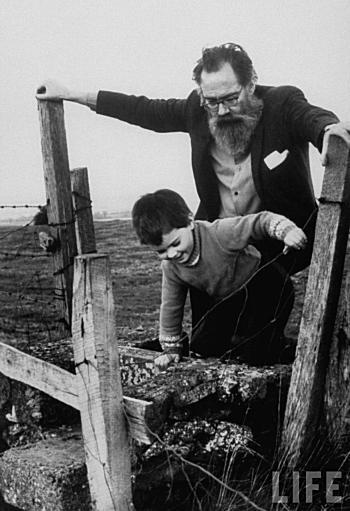
John Berryman
October 25, 1914 – January 7, 1972
photo - Terence Spencer
Dream Song 72: The Elder Presences
John Berryman
Shh! on a twine hung from disastered trees
Henry is swinging his daughter. They seem drunk.
Over across them look out,
tranquil, the high statues of the wise.
Her feet peep, like a lady's in sleep sunk.
That which this scene's about—
he pushes violent, his calves distend,
his mouth is open with effort, so is hers,
in the Supreme Court garden,
the justices lean, negro, out, the trees bend,
man's try began too long ago, with chirrs
& leapings, begging pardon—
I will deny the gods of the garden say.
Henry's perhaps to break his burnt-cork luck.
I further will deny
good got us up that broad shoreline. Greed may
like a fuse, but with the high shore we is stuck,
whom they overlook. Why,—
_______________________
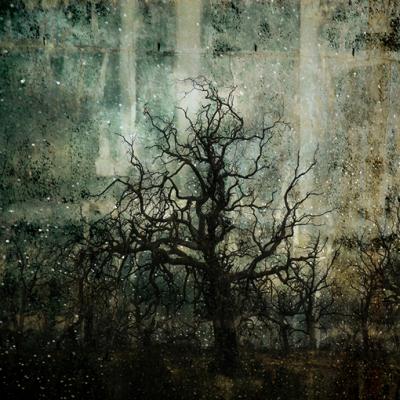
Sentinel
from Filtered Sky series
2009
Troy Ruffels
via A la recherche du temps perdu
_______________________
Scarbo Suite
Aloysius Bertrand
Translations: Gilbert Alter-Gilbert
presented with illustrations by Jacques Callot at
50watts
Lunacy
Reveillez-vous, gens qui dormez,
Et priez pour les trepasses.
[Awake, awake, sleeping men,
And pray forgiveness for your sins.]
—Cry of the night watch
How soft the night, how sweet, when the hour trembles in the belltower, and the sky is lit by a moon whose nose is shining like a golden coin!
*
Two lepers lament beneath my sill: a dog who howls at the crossroads, and the cricket in my hearth whispering prophecies to itself.
But soon my ear interrogates naught but profoundest silence. The outcasts have withdrawn within their kennels, to the strokes of the jack-o-the-clock, as he cudgels his wife.
The dog has taken to its heels, slipping down an alleyway before the halberds of the watchmen, driven by rain and chilled by icy winter blasts.
And the cricket falls asleep as the last spark sputters amidst the madcap swirl of chimney-fleeting cinders.
For my part, I can only say it seemed—fever breeds incoherence—that the moon, screwing up his face, stuck out his tongue at me; a tongue which lolled like a hanged man's!
...(more)
_______________________
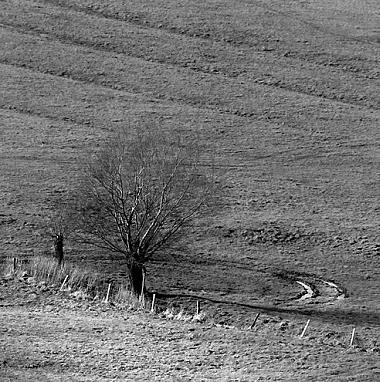
Adam Clutterbuck
flickr
_______________________
It is no easy thing to astonish me. The deep, dark mineshaft of the 21st century has produced some of the most gruesome, appalling, horrifying acts and behaviors ever seen on the skin of the Earth, and it has been my job to report on them, to chronicle them, and to try and make sense of them. The dangerous thing about this job, if you do it long enough, is the callus that builds up over your heart and head. It's a necessary thing; you can endure only so much for so long before the urge to run screaming through the streets tries to take hold, and if that happens, you're no good to anyone except your bail bondsman.
-
William Rivers Pitt
_______________________
If Occupy Wall Street has spread to every city in America, it’s because our financial overlords have brought us to such a pass that anarchists, pagan priestesses, and tree-sitters are about the only Americans left still holding out for the idea that a genuinely democratic society might be possible.
-
David Graeber

abandoned places
saoirse The poetry of exaggeration
Studiolum
_______________________
from “Between Soul & Stone,” two poems
Margo Berdeshevsky
presented by Jerome Rothenberg
BLACKOUTS
(....)
Bruises on the damp nature.
Far from the sound of the lure.
What was it she promised when she was an imaginative child
whispering hard at her own low window, mouth to that low
opening—was it to love? to be better than any sword?
curled at her air-slit in between the house-stones
no higher than her two hands— window no larger than
her face, burning?
There— her sky— there— her sky— its feral, cobalt voice,
and sun that tasted of young honey.
A girl called Joan who would ask a thousand times—
“To shut me out from the light of the sky?”
Who thought a nation
could be ordained.
Cypress. Crepuscule. Lamb. Blackout.
No other voice, a thousand times.
Like bees.
...(more)
Margo Berdeshevsky
_______________________
Seeing for a Moment
Denise Levertov
I thought I was growing wings—
it was a cocoon.
I thought, now is the time to step
into the fire—
it was deep water.
Eschatology is a word I learned
as a child: the study of Last Things;
facing my mirror—no longer young,
the news—always of death,
the dogs—rising from sleep and clamoring
and howling, howling,
nevertheless
I see for a moment
that's not it: it is
the First Things.
Word after word
floats through the glass.
Towards me.

Denise Levertov
(October 24, 1923 – December 20, 1997)
_______________________
Occupy Wall Street and the Poetry of Now-Time
Aaron Gell
(....)The poets were polite. They tried to answer. They were tired, as everyone is down there. Running on pure adrenaline. But these were the wrong questions, the ones you ask when you don’t yet get it. These were the questions of the world outside the park—the world of prose. Occupy Wall Street is actually, it turns out, occurring in the realm of poetry and spirit. It’s a sort of waking dream. Which is why it’s so strangely powerful and cannot be sneered away or shoveled over with cynicism (not that we didn’t try) or kettled into history, and may even survive the winter in New York.
(....)
It seems clear that the lack of demands is not the problem with this thing but its engine. We ask the usual questions because that is how we understand—or, not understand at all, really, but control and contain, and then dismiss or exploit, according to our individual agenda or cast of mind. Those of us standing outside the park—who could, at any moment, simply step across the threshold—want to flick it aside it or put it to use, because that’s what we have learned to do. Box it up, slap on a label, file it away....(more)
_______________________
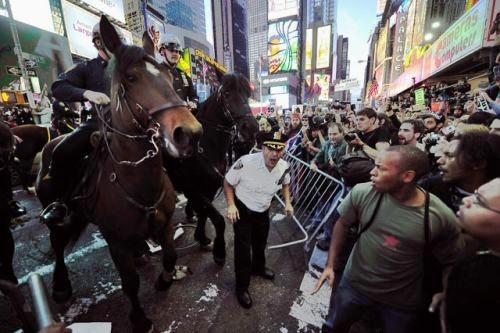 Photograph: Emmanuel Dunand/AFP/Getty Images
The Occupy Wall Street image that marks the end of the global consensus
Even the word 'capitalism' once seemed corny. Here, amid Times Square's corporate citadels, a monster is exposed
Jonathan Jones
_______________________
Occupy! An OWS-Inspired Gazette
n+1
_______________________
Occupy Wall Street is not difficult to understand
Hunter
(....)
Above all, perhaps, it is an objection to the notion that corporations do not just have rights and privileges equal to people, but in fact have rights superior to the rights of people, rights which are appended on in the name of free enterprise and seen by lawmakers and courts alike as being far more obvious and inviolate than those of you or me. It is this treatment—this premise that corporations are super-people that are entitled to more government access, immunity to normal laws, the "right" of profit even if it injures someone else, the "right" to author their own regulations or to dispatch those they find too onerous—that is the most objectionable. Corporations have been declared to have the unlimited right to meddle in elections, unencumbered, as a matter of free speech, but the same right of free speech finds a phalanx of limits set on it early on, when it comes to camping out in a public park or marching on a public street.
The message is very straightforward. It is not difficult to understand. If it is difficult to understand, or if it seems like socialism or communism to you, or if these pleas for basic fairness in the way governments treat their citizens sound radical to your ears, then the fault is yours and yours alone. Those demands were not outrageous in previous decades, so demands to return to similar policies can hardly be considered radical now. If you have your head so very far up a rich man's ass that you think "not a penny more charged to the rich because that would be socialism" is a reasonable statement, but "repair financial regulations whose dismantling helped lead to economic collapse" is in fact the more crazy of the two statements, then there is no hope for you. Perhaps you are merely an oligarch....(more)
_______________________
Rich People Create Jobs!
And five other myths that must die for our economy to live.
Kevin Drum
Mother Jones
_______________________

The villages of yesterday
Poemas del rķo Wang
_______________________
Alterity
Jacek Dehnel
Translated from Polish by Benjamin Paloff
words without borders
The rules are clear: no place to mill about.
There’s no such thing as comfort for unhappy men.
He leaves the tall house and passes through the eye
of the blizzard, insignias unpinned, his neck
exposed by a collar haphazardly removed.
In silence. No one rings him, not even
from his pockets, no sharp objects or dimes,
his shoes unlaced, his loops without a belt.
He’s free to think—or whatever else he pleases,
no one cares where he goes or why—
of Roland, Tristan, Medea, or Lucia
di Lammermoor, in crinoline, but right away
it’s “You hysterical singer, with your terrier
(in an apartment sealed from top to bottom),
with your soda syphon, all made up
for an empty room. An empty, empty room.”
...(more)
_______________________
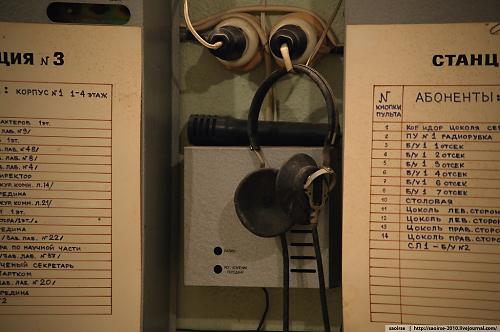
abandoned places
saoirse
_______________________
Wolfman Librarian and the Trembling Pair of Actor Hands
Filip Marinovich
EOAGH Chapbook
Tell me this grove will protect me
From World Trade Towers Lightning forking the brain
(Mine Mine)
Why are there trains under the grass
And my butt is wet
Why do you constantly interrupt yourself
My rhythm is the rhythm of interruption
I walked down Wall Street tonight and it felt
As if someone was walking inside me
Another person taking steps for me
Fuck you who told me I couldn’t write
September Eleventh poetry I’m moving
To Eleventh Street I’m breathing again
The world will become a new City
People will hug in the street Elizabethanly
We will invent a new language together
Queen Elizabeth will return from her coven
Covent Garden and all will sing opera La Boheme
on the steps of the Federal Building joining hands
...(more)
Filip Marinovich
_______________________
Talk in the Dark
Denise Levertov
We live in history, says one.
We're flies on the hide of Leviathan, says another.
Either way, says one,
fears and losses.
And among losses, says another,
the special places our own roads were to lead to.
Our deaths, says one.
That's right, says another,
Now it's to be a mass death.
Mass graves, says one, are nothing new.
No, says another, but this time there'll be no graves,
all the dead will lie where they fall.
Except, says one, those that burn to ash.
And are blown in the fiery wind, says another.
How can we live in this fear? Says one.
From day to day, says another.
I still want to see, says one,
where my own road's going.
I want to live, says another, but where can I live
if the world is gone?
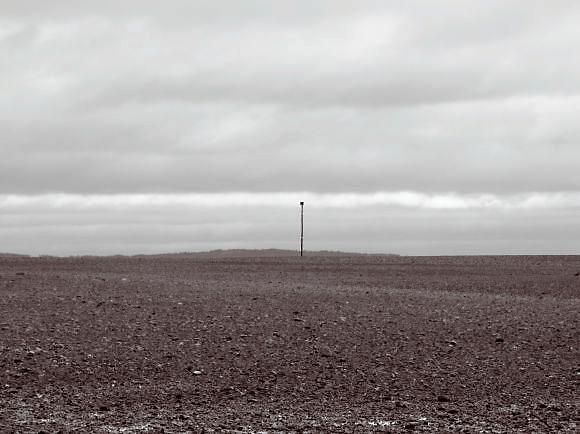
photo - mw
_______________________
Özdemir Asaf - Nine Poems
translated from the Turkish by George Messo
Archipelago
Volume 6, Number 2
As If
This glance is for you to see.
Is there anything more than you?
To the sea, I’ll look to the sea…
Is this all there is of the sea?
Staring only to see something else…
Nature cringes in front of me.
Landscapes pass by the second.
Clouds beneath my feet, you in my head.
At stars, I’m looking at the stars…
You’re here looking with me.
I wonder what happened to the others…
They had words, and enlightened life.
...(more)
_______________________
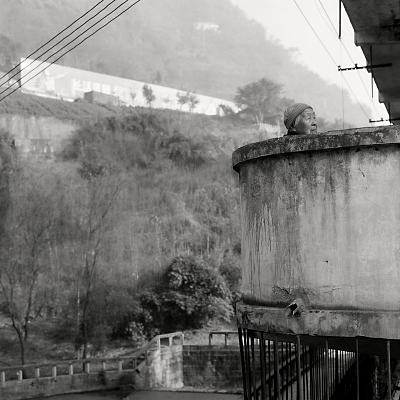
go home
Muge
_______________________
Three Poems from The Rest of the Voyage
Bernard Noėl
translated from the French by Eléna Rivera
TGV
air steams borders leafless branches a low sky
makes eyes believe that finally they see matter
what is the space between these open fingers
a steeple nails the view point of history
forest then green wheat a residue of sun
a handful of cows positioned like white stones
there’s a bridge an orchard a precocious lamp
day hesitates to let go of the world’s frame
it must hang already on that other side
an old sheet returned from too many passions
slowing down helps one discover gentians
a copse on an embankment dappled in red
two idiots in ties talk of added costs
of man’s interface before-seeing-must-see
horizon turn blue to give itself to night
a luminous punch puncturing the moment
the black vapor and play at divine splendor
there is there a kind of maddening beauty
and something at the end like a final gift
when life withdraws by leaving behind to dry
the pinch of nothing that gave it its savor
...(more)
_______________________
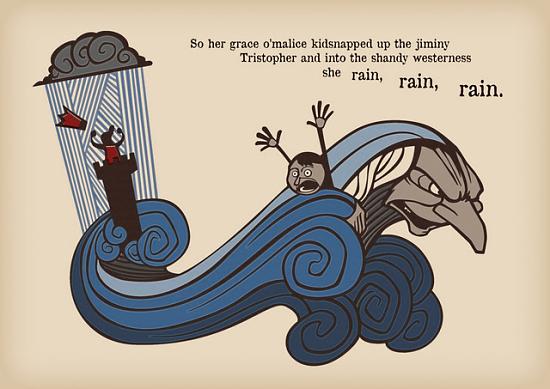
Wake In Progress
Stephen Crowe
_______________________
A Left-handed Commencement Address
Ursula K. Le Guin
b. October 21, 1929
commencement address to the Mills College Class of 1983
Success is somebody else’s failure. Success is the American Dream we can keep dreaming because most people in most places, including thirty million of ourselves, live wide awake in the terrible reality of poverty. No, I do not wish you success. I don’t even want to talk about it. I want to talk about failure.
Because you are human beings you are going to meet failure. You are going to meet disappointment, injustice, betrayal, and irreparable loss. You will find you’re weak where you thought yourself strong. You’ll work for possessions and then find they possess you. You will find yourself — as I know you already have — in dark places, alone, and afraid.
What I hope for you, for all my sisters and daughters, brothers and sons, is that you will be able to live there, in the dark place. To live in the place that our rationalizing culture of success denies, calling it a place of exile, uninhabitable, foreign....(more)
_______________________
The Names of History: On the Poetics of Knowledge
Jacques Rancičre
translated by Hassan Melehy
google books
(....)This siren song of social science is the seduction that history had to resist under the threat of enslavement or death. And it is beginning with this alternative that we must understand the other great tripartite schema, the other "meaning of history" that presides over the definition of the Mediterranean as the subject of history and over its being put into writing. The first two stages once again present to us, above the long time of repetitive activities, the time of the mercantile economies and the structurespolitical, social, and cultural-that give them a place and are transformed with them. But, at the third stage, the relation between the acceleration of the speeds and the growing rationalization is reversed. The sea with the highest speed is the one with the battles and events, those events that "pass across [history's] stage like fireflies," falling back, only just born, like the phosphorescence of the Portuguese shores, into the night that they have illusorily illuminated. In the order of the writing of history, the path from the lowest to the highest speed is that of the intelligibility that gets lost. It doesn't go from the simplest to the most complex, but from the most profound to the most superficial.
...(more)
_______________________
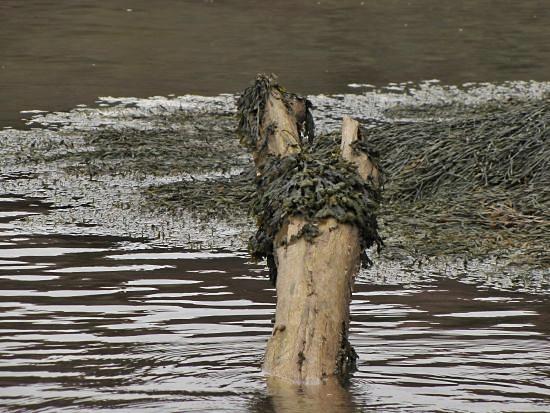
photo - mw
_______________________
Frost at Midnight
Samuel Taylor Coleridge
b. Oct. 21, 1772
(....)
... Sea, hill, and wood,
With all the numberless goings-on of life,
Inaudible as dreams! the thin blue flame
Lies on my low-burnt fire, and quivers not;
Only that film, which fluttered on the grate,
Still flutters there, the sole unquiet thing.
Methinks its motion in this hush of nature
Gives it dim sympathies with me who live,
Making it a companionable form,
Whose puny flaps and freaks the idling Spirit
By its own moods interprets, every where
Echo or mirror seeking of itself,
And makes a toy of Thought.
(....)
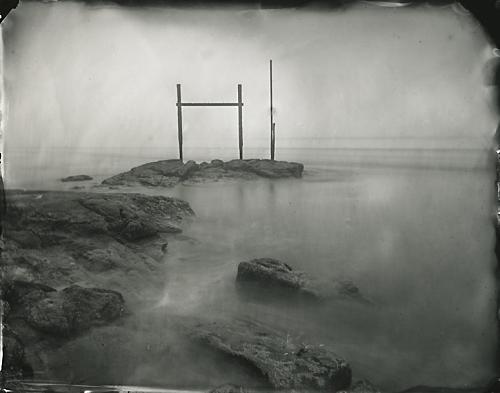
Fort Popham, Maine
Abandoned
Joni Sternach
_______________________
Thirteen Observations
made by Lemony Snicket
while watching Occupy Wall Street
from a Discreet Distance
OccupyWriters
Haiku from Zuccotti Park
Anne Waldman
10/ 10/11 “Columbus” Day/Liberty Plaza
Moloch’s motor got stuck
on the roof of Casino Wall Street
look up! moon, a ghost chip in the sky…
_______________________
The Quiddities
"Take this from this, if this be otherwise": an essay on literary minutiae.
Joe Milutis
triple canopy
A search for the word this on the Web will get you RickRoll’D. The various unrelated hits that appear include This American Life, This Is Why You’re Fat, and a site that asks: “If you are feeling suicidal now, please stop long enough to read this.” When one takes advantage of a more sophisticated Google device, the increasingly popular Ngram Viewer, the statistical portrait served up from the depths of Google’s digitized book collection is just as opaque. Even though it carries with it an aura of the scientific, this Ngram tells us no more about the demonstrative pronoun’s most interesting uses than do even the ridiculously irrelevant top search results for this.
Yet this is a piece of literary minutiae, which, while straining the capacities of any search engine, has had a profound effect on literary experimentation. Why, for example, is our search not topped with William Carlos Williams’s:
—of this, make it of this, this
this, this, this, this
Or Charles Olson’s:
I have this sense,
that I am one
with my skin
Plus this—plus this:
that forever the geography
which leans in
on me I compell
backwards I compell Gloucester
to yield, to
change
Polis
is this
Even with the ability to consult a specialized database like the Chadwyck-Healey, a digital collation of literary texts from the eighth century to the present, the task of making a systematic literary survey of this is daunting. Because of the word’s sheer frequency, it would be difficult to use a computer to search out thises that are significant rather than perfunctory: the meta-thises, the thises about this, all this.
...(more)
_______________________
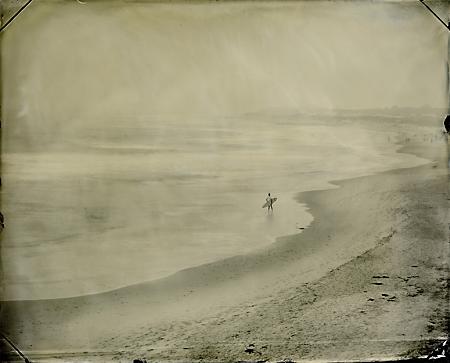
Lone Surfer
Joni Sternbach
2006
Surfland - Photographs by Joni Sternbach Soulcatcher Studio is pleased to present SurfLand, by Joni Sternbach. SurfLand is an ongoing project of contemporary portraits of surfers created using the historic wet-plate collodion process. This very labor-intensive process has changed little since its invention in the 1850s. The photographs are a unique blending of subject matter and photographic technique. Part craft and part theatre, the instantaneous wet-plate collodion process allows Sternbach to create one-of-a-kind tintypes that are imbued with a feeling of ambiguity, timelessness and mystery.
via
Surfers:
wet plate photography, primitive passions
photography and text by
Joni Sternbach
lens culture _______________________
This Mysterious 'This'
Joe Milutis in conversation with Eugene Thacker
ctheory
(....)
You know, Bergsonian ideals have been in the boardroom for a long time, especially when it comes to the selling of consumer technology. But usually, the only thing that is focused on is the more action-oriented, vitalist aspect of Bergson, and only if sanctioned by the device. I think when you add Deleuze to Bergson, he becomes less of a corporate huggy-bear; the Deleuzean reinterpretation brings out the powers of the virtual, which is not the digital, but rather something like the ether in its most radical, deterritorialized form.
(....)
The separation of media studies and production from other forms of university research, the tyranny of the new, as well as bad forms of economic rationality seem to be the biggest obstacles to the future of media studies and the university in general. I think what Al Filreis et al. are doing at Penn State with media is more interesting and sustainable than what tends to go on in new media programs proper. But that's perhaps because I'm literary-minded and find there's an anti-literary mentality in many media programs. But I have an anti-literary strain, too, at least in the way one thinks of the literary as a kind of sanctified preserve, which is why I've been writing on the concept of "virtual literature" as the literature of the unpublished, the fragment, the illiterate. In some ways, it has been a way for me to get back to some vital core of what it means to be creative, especially since I'm linking these ideas of data junk and the unliterary back to Henri Bergson's original concept of the virtual, not to data gloves or online avatars. I somehow think that Henri Bergson will save the world. That's my big pronouncement if you want one. ...(more)
Joe Milutis at PennSound
Ether: the nothing that connects everything
Joe Milutis
google books
_______________________

Patrick Hughes
b. Oct. 20, 1939
_______________________
Happy Birthday Michael McClure
The Allen Ginsberg Project
REACH IN
Michael McClure
b. October 20, 1932
THE NUMBERS ARE ALL WRONG,
the coo and gurgle of the baby
is the equation's truth.
There are no directions, no colors,
no sights, no tastes, no sounds,
except in the shape of building the soul,
or in mating,
or in dodging the predator.
The naked, tiny, pink bird
wiggling next to the green eggs
in the nest
is aliving feast
set to dine on the cosmos and to sip
meat and nectar from the mother's beak.
No
matter
how
far
inwards
I imagine
the reaching of matter,
(till as Ouroboros it swallows
the waves of its tail),
there will still be the snail sleeping
locked in its shell
on the branch
and the smiling cat on the gravel
under a tree.
in THE EXPERIODDICIST #9
August 19, 1995
Michael McClure at EPC
_______________________

Patrick Hughes

finding balance
in the Ottawa river
photo - mw
_______________________
The Sound Words Have
Žórarinn Eldjįrn
bilingual edition
Translated from Icelandic by Lytton Smith
words without borders
Once there was a town where no two people spoke the same language. No one used the same words for anything. And yet everyone understood everyone else and they all lived together in peace and harmony. Until recently, the locals were cheerful, cordial, and— though it’s hard to believe—talkative. The town was in a nameless region deep in central Europe. The place had no name because it was so remote that it was usually represented on maps as a black hole. That is, if it was represented at all.
(....)
A lone historian who specialized in the composition of historical atlases once attempted the hopeless task of drawing a map that traced the evolution of the region’s internal borders. After many years’ work he was stuck with an insoluble tangle of maps that closely resembled the Burda pattern sheets for sewing winterwear. Indeed, his wife accidentally picked up the maps and managed to sew a pantsuit, a sweater, and two party dresses without any difficulty before the mistake came to light.
The townspeople had many centuries of experience in the nuances of the most common forms of government. They’d known dictatorships, totalitarianism, arbitrary coups, republics, and anarchy, to name but a few. Each upheaval was followed by a sputtering indecision, as happens with oppression and liberation, protests and rebellions, and the locals had early on grown tired of the constant need to change language according to who determined the hows and the whys each time. They came to realize that it was more dependable if each person had his own language which no one could take away. It was, in other words, a psychological defense mechanism: each person, faced with an unstable world, would hold on for dear life to his own essence; he would instinctively seek to cultivate his own personal language, a language even more familiar to him than his mother tongue: the language, that is, in which he thought. How could anyone ban that or kill it off?...(more)
_______________________
Common-Place October 2011
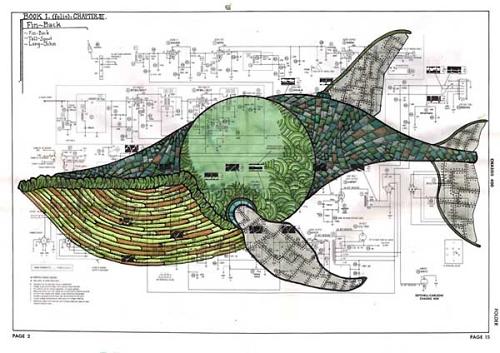
Matt Kish
Blogging Moby-Dick
An artist illustrates every page of The Whale
Jamie L. Jones
(....)This Moby-Dick is not, to put it mildly, a work of realism or rigorous historical interpretation. Matt Kish was not thinking about the history of American whaling when he illustrated Moby-Dick. He told me that he actively avoided doing any kind of historical research at all while creating the illustrations. "It's not that I don't have any specific interest in the nineteenth century, but I made no attempts to be historically accurate… Rather than try to create this historically accurate version of Moby-Dick, I really wanted to go very, very internal, and create an almost symbolic and fantastic rendition."
Kish's Moby-Dick chronicles the kind of experiment that Thoreau tried out at Walden Pond: an experiment in living deeply within a world that is both bounded and infinitely rich in meaning and detail. The 552 pages of Melville's book became Kish's world. Matt Kish has a knack for locating echoes of the nineteenth century in the technology, aesthetics, and humor of the twenty-first. He brings the arcane world of nineteenth-century whaling into camaraderie with the esoterica of twentieth and twenty-first century cultures: machines, comic books, street art, and album covers. Kish even practices his alchemy on the genre of the blog itself, creating a daily marvel out of an arbitrary assignment—one drawing for every page, every day. In a blogosphere that rewards the story of the minute, Kish's project is a monument to sustained attention, rigorous discipline, and long, old, thoroughly material books.
It is hard not to make something out of the fact that Matt Kish is a librarian. After all, it is a Sub-Sub-Librarian who introduces the "Extracts" at the beginning of Moby-Dick: "…this mere painstaking burrower and grub-worm of a poor devil of a Sub-Sub appears to have gone through the long Vaticans and street-stalls of the earth, picking up whatever random allusions of whales he could anyways find in any book whatsoever, sacred or profane." Before Kish started his project, he said he personally identified with the Sub-Sub-Librarian more than with any other character in the novel: "This nameless person assembling all of these mosaic pieces of information: it always seemed like a curious way of introducing the novel to me. I found it endlessly fascinating to read all of these extracts and put them together in a different order. I could see myself as that kind of explorer—not only through Moby-Dick but in general. That was, up until this project." After the page-a-day project, though, Kish felt he had established a personal relationship with the whole novel, and not just with the Sub-Sub.
Whether or not Kish still identifies with the Sub-Sub, they have much in common. It might even be said that they share certain extraordinary library practices. The "poor devil of a Sub-Sub" who introduces the Extracts had become "hopeless" and "sallow," but there were adventures in his past. He had been a librarian in the way that Indiana Jones was an archaeologist: he traveled worldwide to collect his whaliana. Kish is by no means hopeless or sallow, but like Melville's Sub-Sub, he also started his project with a collection that he culled and saved over several years: a supply of found paper on which he drew most of the Moby-Dick illustrations....(more)
_______________________
The Future of Latin American Fiction
Jorge Volpi
three percent
(....)
Unlike their elders, the writers born from 1960 on do not need to found a tradition—as did Fuentes, Vargas Llosa, or Garcķa Mįrquez. They do not possess a Bolivian yearning and do not aspire to become the spokesmen of Latin America: their method, more modest but also more natural, consists in carefully studying the problems and history of their respective countries, and even of the whole region, without the messianic tone of some of their predecessors.
More than discovering a continent, placing a forgotten region on the map, establishing their own spokesmen, positioning themselves as the avant-garde of the elites, the new narrators speak about their countries without the aftertaste of romanticism or of political compromise, without hopes or plans for the future, and maybe just with the proud disenchantment of one who recognizes the limits of his responsibility in front of history. Instead of presenting themselves as inventors of Latin America—the great achievement of the Boom—they seek to decipher and unarm it.
Their books do not pretend to add themselves to the stones with which the writers of the Boom erected their arrogant cathedral of Latin American literature, but miniatures that hope to condense in themselves all that now can be said of Latin America. The paradigm no longer consists in erecting a new tower or a new cupola, but in creating a hologram: novels that only in an oblique and confused, fractal and fragmentary way are trying to disembowel the mystery of Latin America. Novels that look toward The Savage Detectives and, above all, that magnificent hologram of the region which has been so little explored—and is already so opaque due to prejudices and misunderstandings—the somber and enigmatic 2666....(more)
_______________________

photo - mw
_______________________
Dancing the "Republican Two-Step" with Copyrights, Patents, and Corporations
Rudi Colloredo-Mansfeld and Mark Peterson
common-place
Don't Be Afraid to Say "Revolution"
Hannah Arendt Center for Politics and Humanities
Terms of the Occupation
How to use "capitalism," "revolution" and "class warfare" in a complete sentence.
J.A. Myerson
truthout
_______________________
From Rainer Maria Rilke: Duino Elegies
Geoff Ward
The Fourth Elegy
Trees of life. When is your winter. Human
beings don’t cohere. Are not prompted in the blood
like migrant birds. Overtaken, late, we take off abruptly
into the wind and crash on some lost lake of ice.
To flower and to fade meet in us.
Altogether elsewhere, lions roam, unaware of weakness.
But we, intent upon one thing,
are already pulled into another. We’re
split. Aren’t lovers, ever more deeply inside each other, actually
doing solitary, confined by those cave-drawings
that promise vastness, hunting and firelight?
Elaborate gradations of background are laid down
to highlight the moment, the actual, living contour of emotion,
known only if at all by what shapes it from outside.
...(more)
Blackbox Manifold No. 7 (October 2011)
_______________________

photo - mw
_______________________
From Scrolls
an experimental work in progress
James C. Hopkins & Yoko Danno
presented by Jerome Rothenberg
"One of us writes the first half of a sentence and the other follows up with the rest of the sentence. The latter begins the next sentence and drops it halfway, which is taken over by the former. Writing thus in turn we draw 'picture scrolls' with words. There is no rule except that a scroll should consist of five paragraphs."
SCROLL 1
After all the lights have been turned off I watch shafts of moonlight shooting in through the blinds. The bare room starts to reverberate with film-noir certainty. Tonight the moving is finished. All the pictures and photos have been removed from the walls and all the drawers and closets emptied, and only the laptop on the table remains to remind me of what I had formerly considered important. No more ordering the world, and no more maps and calculations. Only some strawberries are left in the empty refrigerator, and tomorrow waiting in a car across the street.
...(more)
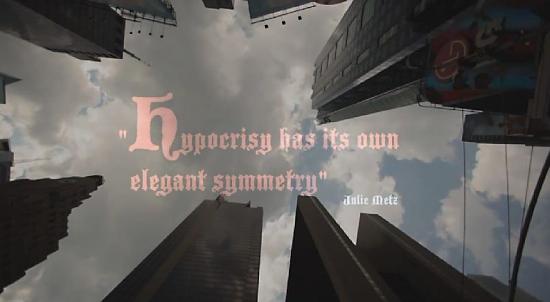
I AM NOT MOVING
Short Film - Occupy Wall Street
youtube
_______________________
You may well ask, “Why direct action, why sit-ins, marches, and so forth? Isn’t negotiation a better path?” You are exactly right in your call for negotiation. Indeed, this is the purpose of direct action. Nonviolent direct action seeks to create such a crisis and establish such creative tension that a community that has consistently refused to negotiate is forced to confront the issue. It seeks so to dramatize the issue that it can no longer be ignored. I just referred to the creation of tension as a part of the work of the nonviolent resister. This may sound rather shocking. But I must confess that I am not afraid of the word “tension.” I have earnestly worked and preached against violent tension, but there is a type of constructive nonviolent tension that is necessary for growth. Just as Socrates felt that it was necessary to create a tension in the mind so that individuals could rise from the bondage of myths and half-truths to the unfettered realm of creative analysis and objective appraisal, we must see the need of having nonviolent gadflies to create the kind of tension in society that will help men to rise from the dark depths of prejudice and racism to the majestic heights of understanding and brotherhood. So, the purpose of direct action is to create a situation so crisis-packed that it will inevitably open the door to negotiation. We therefore concur with you in your call for negotiation. Too long has our beloved Southland been bogged down in the tragic attempt to live in monologue rather than dialogue.
(April 16, 1963)
- MLK
_______________________
The Awakening in America
Ken Knabb
bureau of public secrets
(....)As the movement spreads to hundreds of cities, it is important to note that each of the new occupations and assemblies remains totally autonomous. Though inspired by the original Wall Street occupation, they have all been created by the people in their own communities. No outside person or group has the slightest control over any of these assemblies. Which is just as it should be. When the local assemblies see a practical need for coordination, they will coordinate; in the mean time, the proliferation of autonomous groups and actions is safer and more fruitful than the top-down “unity” for which bureaucrats are always appealing. Safer because it counteracts repression: if the occupation in one city is crushed (or coopted), the movement will still be alive and well in a hundred others. More fruitful because this diversity enables people to share and compare among a wider range of tactics and ideas.
(....)
You have to participate to understand what is really going on. Not everyone will be up for joining in the overnight occupations, but practically anyone can take part in the general assemblies. At the Occupy Together website you can find out about occupations (or planned occupations) in more than a thousand cities in the United States as well as several hundred others around the world....(more)
Effervescence of Radical SituationsKen Knabb
A radical situation is a collective awakening. . . . In such situations people become much more open to new perspectives, readier to question previous assumptions, quicker to see through the usual cons. . . . People learn more about society in a week than in years of academic “social studies” or leftist “consciousness raising.” . . . Everything seems possible — and much more is possible. People can hardly believe what they used to put up with in “the old days.” . . . Passive consumption is replaced by active communication. Strangers strike up lively discussions on street corners. Debates continue round the clock, new arrivals constantly replacing those who depart for other activities or to try to catch a few hours of sleep, though they are usually too excited to sleep very long. While some people succumb to demagogues, others start making their own proposals and taking their own initiatives. Bystanders get drawn into the vortex, and go through astonishingly rapid changes. . . . Radical situations are the rare moments when qualitative change really becomes possible. Far from being abnormal, they reveal how abnormally repressed we usually are; they make our “normal” life seem like sleepwalking.
The Joy of Revolution Ken Knabb (1997)
_______________________
The Eternal Politics of Debt and Forgiveness
A review of early Occupy Wall Street organizer David Graeber’s latest book, Debt: The First 5,000 Years.
Anthony Kammer
(....)
In his book, Debt: The First 5,000 Years, anthropologist and early Occupy Wall Street organizer David Graeber, makes a compelling case that debt relationships are among the oldest and most fundamental organizing mechanisms in human history. From ancient India, China, and Mesopotamia, to the slave trade in Africa, through Medieval Europe and into the modern liberal state, debt has provided a system for social sorting and served as one of the primary institutions of resource allocation. And because debt is so crucial to social order, relationships between debtor and creditor have generated many of mankind’s most virulent rebellions, wars, and revolutions and set the terms of political dispute since the earliest written records. In his work, Graeber has drawn attention to a staggering range of political structures and philosophical attitudes that have arisen to manage debt relationships and has painstakingly documented what happens when those relations spiral out of control.
Beyond being eminently readable and jargon-free, this well-researched mix of anthropology, economics, and intellectual history could hardly be more timely. While the careful attention he gives to other societies and economic arrangements alone make the book worth reading, Graeber is also a self-described political activist who understands how history has the potential to reframe our grasp of the present. While he rarely takes overt political tones, he places debt at the center of economic history and aims to upset assumptions that many economists and policymakers take for granted. It is perhaps Graeber’s greatest accomplishment that he reminds readers of a fact that would have been obvious at almost any other period in history: Debt is not a problem to be resolved by natural law or cold, impersonal economic principles. It is a political and moral problem, and one with the potential to rapidly and irreversibly transform societies....(more)
David Graeber Essay Collection
David Graeber
mediafire pdf
_______________________

Walker Evans
_______________________
Nothing to be done
Neil Fitzgerald
A philosophical look at tramps in Paris
(....)
Nothing to be done, says Estragon. Our consciences, so easily pricked, read this as: there is no cure for people such as these. But surely this has a far more literal meaning for these vagabonds: they are doing nothing. Why? Because nothing we do needs to be done. That devastating existential fact still haunts us, as we bury ourselves in perceived necessities, entangle our minds in novel distractions, like social media. Life is absurd. For we can ascribe to life whatever meaning we want. As Sartre succinctly noted: man makes himself; he is not born ready-made. And perhaps the clochard can stare at this stark truth more readily than us.
So I go on regarding these castaways from the common stream of life, these hermits who, whilst living among us, are as isolated and incomprehensible as Diogenes of Sinope must have seemed c350 BC, living in his tub. And I borrow the pattern of their existence because, as R S Thomas saw, they are somehow able to keep resisting these unfathomable plights day after day, year after year:
Yet this is your prototype, who, season by season
Against siege of rain and the wind's attrition,
Preserves his stock, an impregnable fortress
Not to be stormed, even in death's confusion.
Remember him, then, for he, too, is a winner of wars,
Enduring like a tree under the curious stars.
A Peasant, R S Thomas
...(more)
nthposition_______________________
“I am the turnstile”: Roaming with Tomas Tranströmer
Steve Himmer
The Millions
(....)
Tomas Tranströmer wanted to grow up to be an explorer, and he’s done so: he’s a surveyor of quiet frontiers, of the brief, daily border crossings between one possible life and another — the crossings we make in secret moments, perhaps just a few seconds, when we allow ourselves to imagine or to wonder or to just pay attention. Lately I’ve been reading The Secret World of Doing Nothing, a study by Swedish anthropologists Billy Ehn and Orvar Löfgren of “what is happening when, to all appearances, absolutely nothing is happening.” A problem that comes up again and again as they interpret strangers waiting in lines or killing time is the struggle to plumb the depths of another mind in such moments: how far afield do they wander, and where do they roam? Tranströmer’s poems offer myriad answers, a humanist bridge between the individual and the collective through moments that might seem to lead nowhere....(more)
_______________________

Little Sparta
the garden of Ian Hamilton Finlay
Lanarkshire, Scotland
Photo by Dave Paterson
_______________________
Ian Hamilton Finlay’s Making
John Latta
(....)
(a solace, against the ravages of untoward clamp-jawed seriousness, what poetry-making’s clampdown twenty-first c. careerist demands demand of “us” each) Finlay’s remarks to Robert Creeley (Christmas Day, 1965):
. . . I think you should not worry about not writing poems, if you are still not. I know it is a misery when one feels like that, but you can remember against it, that you are very prolific when you do write, and that you already have a bulk of work that should satisfy anyone. Part of the problem . . . is that one would like (at such times) a kind of craft, to give each day a small satisfaction at least, and make sleep possible and food palatable . . . That was one reason I liked making toys—but that craft has rather vanished for me now, for, having ceased to amaze myself by my ability to cut a bit of wood with a fretsaw, I began to feel it as an art, and that is the end of pleasure . . . What we need is some simple craft at which we continually astonish ourselves by our extraordinary talent, while finding it mere child’s play, without judging it to be literally so (even if it is).
The glad import of amateurish “dabbling.” The constant longing to return to that root ludic compulsion....(more)
_______________________
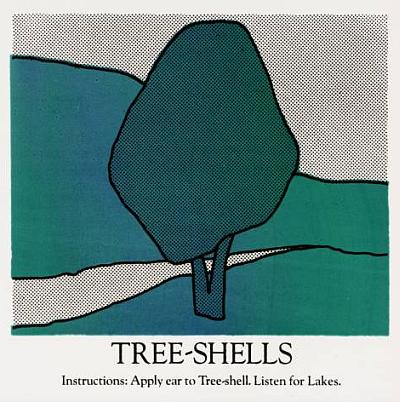 Tree Shells
1975
Ian Hamilton Finlay
Ian Hamilton Finlay Avant gardener
Little Sparta Trust
Little Sparta
the garden of Ian Hamilton Finlay
Flickriver
The Death of Piety
Ian Hamilton Finlay
in conversation with Nagy Rashwan
jacket _______________________
The Human And The Octopus
A Philosopher's Sickness
Tom Stern
(....)
When I am not hospitalized—and thankfully that is almost all of the time—I am nothing if not a thinking man. At home I read books, clutching my pencil, scribbling furiously in the margins; at work, I talk to students, and I tell them what I and others think and then they think about it. Sometimes I write my thinking down, and other thinking people think about it and write about it and then for a short time we think about it together. And yet there, in my hospital bed, drugged and pained, scared, I am not thinking. And now that it’s over, and my recovery is for the moment complete, I find myself back here again—back at my thinking and my writing. There is, however, a problem with writing about being ill. Confronting the sweaty labor of sickness from the sober state of reflection involves a translation between two distinct languages, languages which share no common roots, whose terms extend to none of the same objects. If I force myself to carry out this feeble conversion exercise, then it is because there is a market for it, at least one eager reader, who can never have access to the original: me myself, cured and thinking once more....(more)
The Point
_______________________

Egon Schiele
1890-1918
_______________________
A Poetics of Oil, A Politics of Action
Philip Metres
(....)
I love Jonathan Skinner's and Brenda Hillman's idea of reading poems to staffers and congresspeople; the more we bring our bodies, the harder it is to silence our voices. I'm aware of the caricature of poetic activism—the most piquant of which is the earnest enviro-poet in "I Heart Huckabees" who reads his verse to yawns at the latest action, and is later replaced by a slicker, hipper, marketing stud. Sometimes poetic speech—vital, interpellative, mindchanging speech—is not just The Poem, but is Poetry in its most nervy performative sense....(more)
Interim
Volume 29 Summer 2011 edited by Claudia Keelan
Philip Metres' blog - Behind the Lines: Poetry, War, & Peacemaking
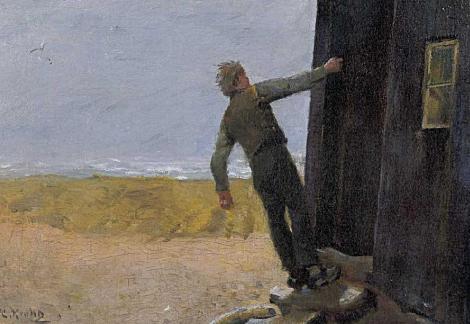
Christian Krohg
d. Oct. 16, 1925
_______________________
The Meaning Of The Sea
Alexander Vvedensky
translated from the Russian by Alex Cigale
to understand it once and for all
one must live life as in reverse
and to take walks in the forest
while tearing out your hair whole
and when you get to know the fire
of the light bulb or of the oven
say to it why are you shining
you the fire are candle’s master
what’s your meaning is it nothing
where’s the kettle where the cabinet
the demons whirl around like flies
circling above a piece of pie
(....)
but however the years were passing
passing were the fog and nonsense
who had fallen to the sea's bottom
like a board from the ship's timbers
became sad and full of longing
knocking together wisdom teeth
sit on top of the colorless seaweed
hang to dry out laundered muscles
we are blinking like the moonlight
when the waves tremble aglimmer
who was it that said the sea's bottom
and my foot are one and the same
generally all here are dissatisfied
in silence they walk out of the waters
while behind them hum the waves
putting their shoulders to the wheel
...(more)
mayday
_______________________
Triptych: On Turning Sixty-Five
Robert Gibbons
II. A Destination the Dream Refused to Name
Better be first, rather than second nature to the act of writing. Two dreams
hanging around for nearly a week after they arrived on the morning of my
birthday requiring language to their imagery. Seawall I lived with for years
years back appeared on the left side, another barrier to be traversed, which I
did in the lightness of a leap to see the water rich in color, deep reds & golds.
I dove in. Swam to a rock outcropping. Drying off on the ledge, I looked
across the water, where an ancient stage, purely Dionysian? or Hopi? with a
backdrop of ochre light presented a lone actor moving stage left, spotting me,
& heading toward where I was seated, or now standing, in order to reassure
that the abyss below on the ledge was no threat at all. Soon after that, my big
(fireproof) valise open, carefully placing & adjusting, so they wouldn’t
crowd or crush one another, rolled scrolls, prints, & posters, as if readying
for a trip, or the longer journey with a destination the dream refused to name.
Time Capsule
_______________________

Constantine Manos
1962
_______________________
Buying Tomorrow
Jennifer Szalai
Lapham's Quarterly
(....)
To cast lots for Christ’s robe, as Pontius Pilate’s soldiers did, was to play a game of chance. Gambling is one of those activities, along with religious worship and prostitution, that was popular already by the time any recording of history began. Our modern financial system owes much to this desire to make a fortune off of Fortune, though a society that organizes itself around financial risk-taking, whose national assets oscillate in an invisible cloud of ones and zeros, requires a very particular understanding of what the future can hold. Finance makes a commodity out of expectation, something to be bought (preferably low) and sold (preferably high). In the case of the worried farmer or the worried breadwinner, the future can also be viewed with suspicion, but finance enables the anxious to trade one possibility for another: both the speculator and the hedger are seeking the best future that money can buy.
(....)
And so it was that risk, and the purported ability to manage it, brought Wall Street more than once to the brink of self-annihilation. Peter Bernstein may have been right when he observed that the future no longer belongs to the gods, but we have made a habit of finding God in the strangest places, whether it be the Shroud of Turin or the formula for a derivative’s price. Finance has given the future over to mathematics and supercomputers, which, like any other prosthetic god, bring with them the temptations of both recklessness and complacency. Our technologies belong to us; we create them, and they amplify our abilities and our reach, yet we exhibit a strange eagerness to relinquish our dominion over them, endowing them with a monstrous authority that demands our accommodation and surrender. We have made a fetish out of finance, against which proper regulation gets derided as the comedy of mere mortals—not just difficult but absurd....(more)
_______________________
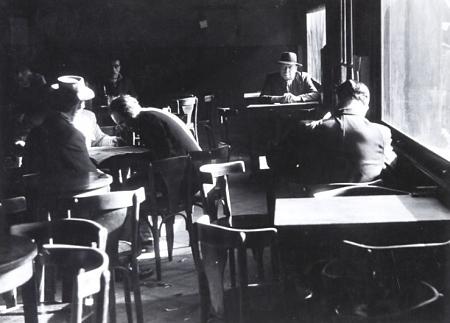
Sameer Makarius
ca. 1950
Light of Modernity in Buenos Aries, 1929-1954
Photography In Argentina 1930s-1950s [pdf]
Valeria Gonzįlez
Translated by Craig Epplin
_______________________
The Colossus Of Rhodes
George Moore
seems less real today, in the postmodern
aftermath of history, for it has stood, straddling the harbor
only in some Einsteinian time, out there ahead of us
before an earthquake brought its rumor down.
It was never where they said it was, or its shell,
the bronze of its massive arms and legs, and what then
of the genitals? Those Greeks like them small, well formed
but still, where has the great metal phallus gone?
We sail into the harbor on the backs of dolphins
as the dead do in other places, and view only columns
mounted with stag and doe, the modern equivalent of care
with history, delicate rather than imposing.
If this beast of bronze never did exist, The Seventh
Wonder of the World would be a myth, and there’s
more than something real in that, for the writers, travelers
of the past, would have created our best hope.
But today I can see it, boy-eagled over the murky depths,
and watch as the Japanese, Sweds, Germans, lingering
bankrupt Americans, all with their perfect daughters
and sons, snap photos of the empty air.
mayday
_______________________
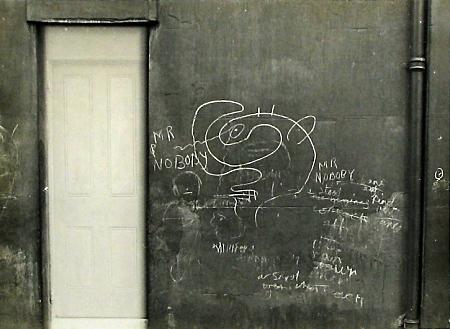
Horacio Coppola
1934
Light of Modernity in Buenos Aries, 1929-1954
Nailya Alexander Gallery
via gmtPlus9(-15)
|

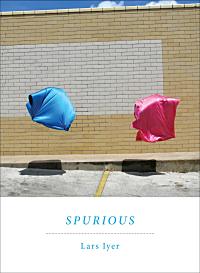


 The Age of Briggs & Stratton
The Age of Briggs & Stratton













































